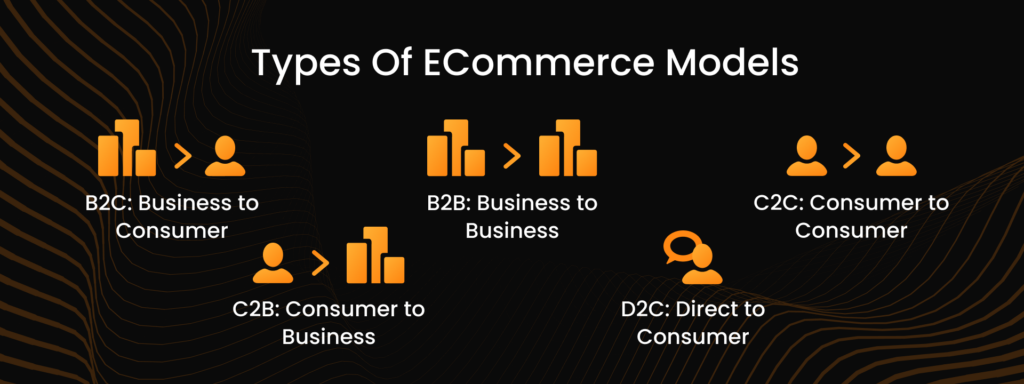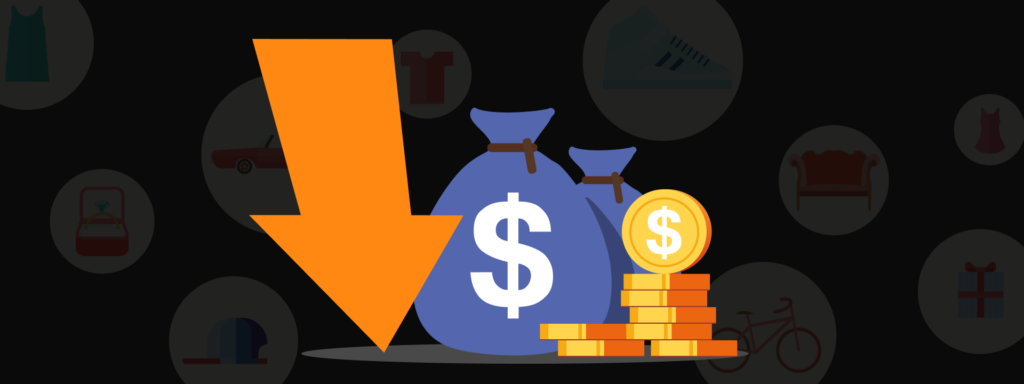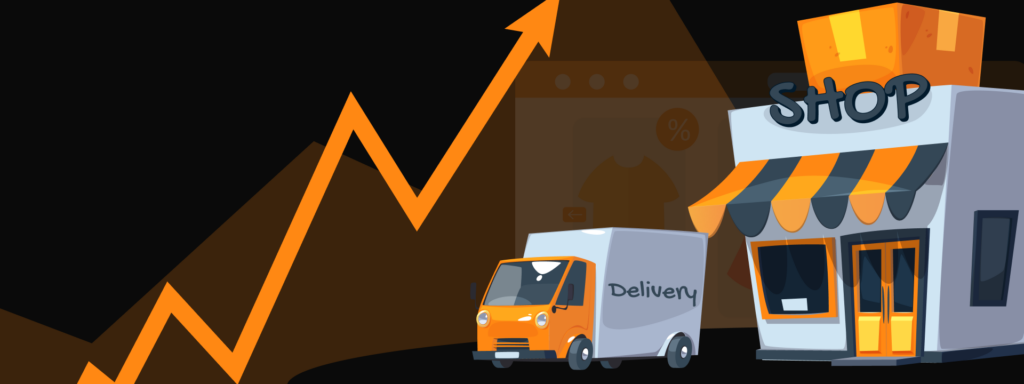Like it or not, eCommerce has become an integral part of our lives. It’s hard to find a person who has never purchased anything online, and most people buy things online on a regular basis. More and more companies refuse to build their business offline and focus on their online presence. And there’s no wonder since the benefits of eCommerce are endless.
In this article, we’ll discuss the types of eCommerce models and the advantages of eCommerce for customers and companies. Let’s dive right in.
Types of eCommerce Models

The only difference between eCommerce businesses and brick-and-mortar stores is that all the interactions and transactions are made through the internet in the first case. According to stats, 95% of all purchases will be done through eCommerce by 2040. Just as with brick-and-mortar stores, there are different types of eCommerce businesses, depending on their ways of communicating with customers, acquiring goods, etc. Let’s review the most common types of eCommerce models. But first note that you can hire dedicated eCommerce development team from our company for any of these business models.
B2C: Business to Consumer
One of the most popular models, also known as the retail e-commerce model, involves direct sales between businesses and customers. A popular example of the B2C model is Amazon. Both sellers and buyers have convenient conditions to sell and buy products anywhere, anytime. B2C is growing rapidly and is expected to make approximately 6.3 trillion USD in global sales by 2024.
B2B: Business to Business
This model includes exchanging goods, services, and information between various businesses. For example, a wholesaler and an online retailer working together are examples of a B2B model. B2B online sales are expected to reach 1.8 trillion U.S. dollars in 2023.
C2B: Consumer to Business
This type of eCommerce involves consumers or end users providing the organizations with products or services. For example, Google AdSense and Shutterstock are among the biggest examples of the consumer-to-business models of eCommerce. C2B allows companies to extract value from the consumers while the end users benefit from flexibility, direct payments, reduced pricing on the products & services, etc.
C2C: Consumer to Consumer
In this case, people sell their products or services directly to other individuals. Such platforms as eBay or Etsy are examples of this particular model. In this case, the role of an eCommerce platform is to bring two parties together and provide them with a space for buying & selling goods and services.
D2C: Direct to Consumer
This is the newest eCommerce model type, meaning that manufacturers and brands sell their products directly to consumers without relying on distributors and third parties. A popular example of this model is selling on social media platforms, such as Facebook or Instagram.
Benefits of eCommerce for a Customer
eCommerce is growing in popularity primarily because it’s a more convenient way of shopping for consumers. The benefits of eCommerce for consumers are making more and more customers rely only on online shopping. The trend for shopping online was growing even before the pandemic, and the outbreak of Covid-19 helped the use of online sales to skyrocket. In 2021, 2.14 billion people purchased goods and services online. If you have been planning to start your own eCommerce business for a while, but don’t know where to start, take a look at the article:
Meanwhile, let’s take a look at eCommerce benefits for consumers.
More Informed Decision-Making

When searching for products online, you don’t feel the pressure of making on-the-spot decisions while considering whether to buy a product in the store, with a consultant breathing down your neck. Instead, you have plenty of time to do your own research, compare prices, learn all the product information, etc.
You have everything you need to make an informed decision, from reviews of other customers to usage videos and product descriptions.
A Wider Range of Products and Services

If you are looking for a specific type of product or service, you get to look for it anywhere in the world. Compared to the brick-and-mortar stores, you get to explore a much wider range of products and services and have a higher possibility of finding the product that matches your needs exactly.
Saved Time & Convenience

While offline shopping requires a lot of time and energy, especially when you are looking for something particular and need to hit dozens of stores, online shopping can be done from the comfort of your home, and you can review dozens of stores within just a few clicks.
Besides, online shopping is available 24/7. No matter when you want to shop for products, whether during your lunch break or on a midnight shopping spree, the eCommerce world is just a few clicks away.
Lower Costs

In general, products and services offered on the internet are cheaper compared to brick-and-mortar stores. Shopping online saves you money, and not only the extra costs you would spend on the products but also on the transportation you’ll use to get to the offline stores, etc.
When shopping online, you have plenty of options to check out and can find stores that offer lower costs for the same products. Besides these benefits, online stores often have lots of sales, discounts, and benefits for first-time customers as well as returning ones.
Have a business idea but don’t know where to start?
Our team helped dozens of business owners to launch their eCommerce stores. We have years worth of experience and skill to build a tailored solution for you. Contact us and let’s work on your idea together!
Benefits of eCommerce for a Business
Now let’s talk about eCommerce business owners. As the owner of the eCommerce store, you also get lots of benefits when choosing this type of business. Let’s take a look at some of them.
Reach More Customers

With an eCommerce store, you are open to more than just the customers who can physically reach your store. Instead, you get to interact with your audience whenever you want. While offline stores have only a few options available to reach new customers, you get to use any possible channels for your store. From social media to emails, you can target different social groups.
Besides, 87% of consumers start their product search journey online, comparing prices, reading reviews, and so on. All of these people are your potential customers.
Scale Up Without a Hassle

If you have an offline store and want to scale up your business, it’s a whole ordeal that requires considerable time and money investment. Especially if you want to open new stores overseas. You need to pay for the new team, rent, advertising in the new market, etc. Meanwhile, if you want to scale up your online business, you only need to figure out how to attract new target audiences and set up shipping & delivery methods.
Get Affordable Advertising

Sometimes, all it takes to become a successful business is one viral TikTok ( we don’t recommend relying on such luck, though). Anyway, online marketing provides you with numerous tools to advertise your business using minimal effort and resources.
Online marketing allows you to show off your products and services quickly, efficiently, and creatively. Additionally, branding has become more affordable. You can hire freelance designers to create logos or banners, reach out to potential influencers to cooperate with them, etc.
Access Huge Search Engine Traffic Potential

Brick-and-mortar stores have to rely on high-traffic areas and put efforts into marketing in order to get more visitors and walk-in shoppers. Having your business online, the possibilities are endless. If you use the right search engine optimization approach, your store will end up at the top of search results. Did you know that 53% of website traffic comes from organic searches?
Learn more about search engine optimization and how it affects your business in the article:
SEO for eCommerce stores: Everything You Need to Know About It.
Final Thoughts
Summing it all up, the future is in eCommerce. More and more customers focus exclusively on online shopping, and businesses are transferring their activity online in increasing numbers. eCommerce benefits range from lower prices for customers to easier ways to scale up for consumers.
The key is to set up your eCommerce business correctly right from the start. From designing the product pages and catalogs to performing SEO optimization, your store has to really stand out from dozens of competitors to catch the attention of visitors. Our team can help you handle all your eCommerce needs. You learn more about our experience and expertise on the About Us page. You will see that we have provided eCommerce management services to eCommerce businesses for more than a decade now.
